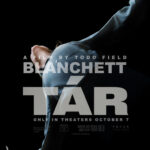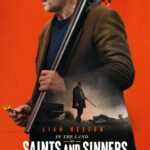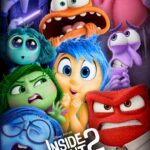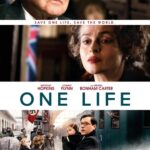THE ZONE OF INTEREST
*CUT TO THE CHASE*NOTE: This spoiler was submitted by Spectre
We open to the Höss family swimming at a lake near their home. Rudolf Höss (Christian Friedel) and his wife Hedwig (Sandra Hüller) watch as the children swim. Their boys swim some more as their daughters pick wild flowers. After a while, the group walks back through the forest to the cars that will drive them home.
At night, everyone gets ready for bed. Höss appears pensive.
The next morning, his two sons blindfold him and bring him outside for his birthday surprise. They have gotten him a kayak, which he loves. He thanks his family for the lovely gift. Gunshots ring out behind them.
Hedwig is in her garden with her infant daughter. The little girl grasps at flowers as her mother points out and names each one of them.
Later, a Jewish prisoner arrives with a wheelbarrow. He takes a sack from it and hands it to a servant girl. Inside are can goods and clothing. Hedwig takes the clothing and places it out on the table, telling the girls they can have one piece each. It is clear they have been taken from prisoners.
Upstairs, Hedwig tries on a lavish fur coat, obviously stolen from another victim of the camp. In the pocket, she finds a tube of lipstick. She hands the coat to one of her servants, telling her it has to be mended. She later tries out the lipstick, liking the color.
Höss arrives home from his duties, leaving his boots outside. A prisoner quickly picks them up and begins to wash them clean. Superiors of Höss arrive to talk business.
Meanwhile Hedwig has friends over and they have lunch, joking about the prisoners and the various clothing items they are able to procure from them, laughing about it. Hedwig even says one prisoner tried to hide diamonds in a tube of toothpaste. One of Hedwig’s female servants carefully and nervously pours a shot of alcohol into a glass and leaves it outside for Höss.
Höss meets with an architect who shows him plans for a circular crematorium oven that will allow one side to burn bodies while the other side cools to shovel out the ashes, allowing for continuous burning. Höss is impressed with the efficiency and thinks it would be a good idea to implement at Auschwitz.
Höss goes outside to have his drink to be met with all the guards of the camp, wishing him a happy birthday.
We see his younger son play with toy soldiers while his oldest son Klaus gets into his Hitler Youth uniform. Klaus goes on a horseback ride with his father. Höss says he hears the sound of a Heron as they ride. In the near distance, guards are shouting and berating Jewish workers.
Höss has a birthday cake with his family.
Late at night, Höss goes outside and smokes a cigar. In the distance, the crematoriums billow smoke and fire.
At bedtime, Klaus is looking at something in his bed. When his younger brother asks what he is doing, Klaus says he is looking at gold teeth. He looks at several. His brother makes noises to annoy him.
Höss locks up the house when he finds one of his daughters sleepwalking, claiming she is ready to hand out sugar.
We cut to footage, shot in photo negative night vision of a young girl, gathering fruit and other food into a tarp.
Höss reads his daughters a bedtime story until they fall asleep.
In his bedroom, Höss talks to his wife, who tells him his coworker Bracht will call him the next day. Hedwig gushes about the spas of Italy and begs Höss to take her back there. Höss says he will but cannot guarantee when he can.
The next day; we see a close up of a soldier as we hear another train arrive. We hear gunfire, screams, pain, and misery.
A voiceover narrates a report to Martin Bormann, speaking of a transfer that Höss is about to be given. The writer of the letter, Bracht, speaks of Höss and how efficient he is at eliminating the Reich’s Jewish problem and how invaluable he is to running Auschwitz and that he should be allowed to stay in his post.
Höss takes two of his younger children on the kayak with him on the lake. After paddling for a bit, they stop to wade in the water while Höss fishes. Suddenly, the water behind him begins to change color. Noticing, he reaches into the water and pulls out part of a human skull. Realizing the lake is being contaminated with the ashes of the dead, he rushes to get his kids out of the water. The weather turns for the worst, bringing rain, and he ultimately has to drag the kids back on the kayak via a rope.
When they get home, the kids are vigorously scrubbed down. Höss cleans himself up and blows his nose, snorting out ash.
Höss tries to read with the radio playing but cannot focus on either.
Later, Höss gets a call in his office. Despite his reluctance, and others going to bat for him, he is to be transferred away from Auschwitz to Oranienburg.
Hedwig’s mother comes to visit. She is in awe of Hedwig’s home. She mentions a lot of people are moving to the area since “All the companies are here” (using slave labor). Hedwig proceeds to give her mom a tour of the house, the garden, and the pool. Hedwig points out the camp wall, and her mother mentions a Jewish woman who she didn’t like and who outbid her on curtains she liked. Hedwig smarmily replies that the woman is on the other side of the wall now. As they sit down to relax, her mother congratulates her on how far she has come. Hedwig can only agree. “Rudi calls me the Queen of Auschwitz!” she exclaims gleefully.
Höss dictates a memo to the camp guards about the lilacs that surround his house. He notes that they are for everyone to bring some beauty to the camp, and those who exceed in taking them, will be punished.
We see close ups of several flowers. We hear more shots, more screams, more death.
Later, the Höss family is having a pool party with several friends in attendance. We see kids splashing in the pool. A young couple making out. Höss is in a white suit, overseeing it all. In the background, another train of prisoners arrives. It is during this party that Höss finally tells his wife of his promotion and transfer and they will have to leave. Hedwig is furious, and says he should go all the way up to Hitler to prevent it. Höss doesn’t want to argue the issue and leaves.
Hedwig storms through the house. One of her female servants stands still like a statue, terrified. Hedwig sees a puddle that a few of her kids made earlier being wet from the pool and screams at one of the girls to mop it up. “YOU LIVE WELL IN OUR HOUSE!” she screams, obviously indirectly threatening the worse befalling them. They quickly get back to work.
Hedwig finds Höss at a nearby pier. He tells her he has not been given reasons for his transfer beyond structural changes and he is basically waiting to be told to leave. Hedwig puts her foot down, refusing to leave her comfortable life. She tells Höss he will go and she and the children will stay at the house in Auschwitz. He should ask that as an ironclad condition of his transfer. Hedwig tells him that this is their home, where they have been living the ideals that Hitler always espoused. She knows that he will be working all the time and they will rarely see each other but she will miss him. She notes that after the war is over, they will farm like they always dreamt of.
Hedwig’s mother is outside sleeping in a lounge chair when she wakes up coughing from the smoke.
Höss tells his children that he has to leave and that he will miss birthdays and anniversaries but their sacrifice now will be the foundation of the life they will have later.
Later that night, Hedwig’s mother tries to sleep but the chimneys of the camp burn so bright that they light up the sky. In that moment, she understands completely what is happening in the camp, and the high price her daughter is paying to have her idyllic, perfect life. The thought of it horrifies her to her core.
Höss says goodbye to his horse.
Höss calls the architect of the crematorium design, telling him it is perfect for the camp and he should patent the design. A young girl comes inside his office, sits down, removes her shoes, and frees her long billowing hair. It is clear that she is there to have sex with Höss to curry favor, or just to live a little bit longer.
Höss writes out a memo, accepting his transfer on the condition that his family gets to stay at their home in Auschwitz. Going into the basement, he proceeds to wash his genitals, so his wife does not know of his infidelity.
Going back upstairs, Höss finds his daughter sleepwalking again and brings her back to bed. As he tells the ending of Hansel and Gretel, we once again see photo negative footage of the young girl collecting food. She sneaks into the camp and puts fruit behind multiple shovels for the prisoners to find and eat. We see another train arrive at the camp. The girl carefully gets her bike and waits for guards to pass by her. She then bikes back to her home and arrives safely. The following morning, she plays a piece of music she found by a Jewish composer that talks of their horrific struggle but ends with the hope of salvation.
Meanwhile back at the house, Hedwig is having breakfast, only to discover that her mother left without telling anyone in the middle of the night. She finds a short note, and reads it. She angrily burns it after. Taking her rage out on one of the servant girls, Hedwig tells her that if she wanted it, she could order her husband to have her killed and have her ashes spread on a field.
Hedwig soaks in the bathtub.
Höss has a final horse ride with his son, explaining his promotion and how he is there to deliver “yield” (i.e the most number of dead possible).
A worker is working on the greenhouse in the backyard. Hedwig offers him a cigarette.
Höss’ younger son is playing in his room when he hears a commotion outside. Two prisoners were fighting over an apple. He hears his father order the man to be drowned. His son watches and hears the man scream as he is killed. “Don’t do that again,” he obstinately says to himself, not wanting to see things like that.
We see workers tending to garden, using the ashes of the dead as fertilizer.
Höss arrives in Oranienburg at this new job. He attends a large meeting with the other camp leaders and explains the number of prisoners coming to his camp each day, and how many are put to work, while the rest are immediately killed. He underlies his efficiency at getting the task down. His coworkers praise him, telling others he gets fan mail from CEO’s for all the workers he gives them.
Back at the camp, Höss’ two sons play in the snow. Klaus traps his younger brother in the greenhouse while the smokestacks continue to pour ash into the sky.
Höss is given more responsibilities and is told he will report to Adolf Eichmann. When he leaves one of his fellow officers voices concern but is reassured. “He won’t put them all up the chimney. You’ll get your workers.”
Hess goes to the doctor. While most of his bodily functions are normal, he feels off and is having trouble sleeping.
After the doctor, he calls home to Hedwig and tells her that he will be able to come home to them. He tells her he has a party to attend but will call her after.
Höss attends an elegant party, complete with high end food, drink and an ice sculpture swastika. Though he talks to a few people, Höss is aloof and feels out of place, like he doesn’t belong.
Höss calls Hedwig late that night. He tells her that a new operation to eradicate all Jews in Hungary has been named after him. She asks about the party, and he notes that all he could think about was the best way to kill everyone in the room via gassing them. For the first time, Höss has openly spoken about murder, not hiding behind technical terms. Hedwig, tired and annoyed, doesn’t catch his slip up and tells she needs to go to bed.
Höss leaves his office and begins to walk down the stairs only to begin to dry heave to the point of almost vomiting several times. He spits and collects himself. Stopping at the second floor, he looks down a dark hallway, seeing a pinpoint of light.
The film cuts to present day where several workers are cleaning the Auschwitz museum, mopping, vacuuming and cleaning the windows that show the displays of luggage, shoes, and other possessions of long dead owners. What the Nazi’s tried to erase, the world now maintains. The horror of the act must remain, for the world to continuously remember.
The film cuts back to Höss still looking down the dark hallway apparently lost in thought. He looks as if he subconsciously has a bad feeling about what’s to come. He shakes the feeling off and pulls himself together. He walks down a final, pitch black flight of stairs and out of the building, until he is no longer visible.
Rudolf Höss (Christian Friedel) and his wife Hedwig (Sandra Hüller) live an idyllic life with their children at their massive estate situated right next to the Auschwitz death camp, which Höss runs. Höss has become so efficient at finding solutions to killing Jewish prisoners that he has been promoted and forced to transfer away from Auschwitz.
Hedwig refuses to leave and makes a condition of his transfer that the family is allowed to stay, unwilling to give up her perceived perfect life. Her mother comes to visit and is initially proud, but when confronted with the reality of mass murder her daughter is building her life on, flees the estate without saying goodbye.
Höss continues to rise in the ranks and is eventually allowed to return back to Auschwitz. He calls his wife and for the first time, openly discusses murder without hiding behind technical terms. His wife doesn't even notice, telling him she's tired.
Höss leaves his office but finds himself on the brink of vomiting several times. He peers down a dark corridor. The film jumps to the present day where the camp is now a museum, carefully maintained to encapsulate the horror of the Nazi's and Höss' actions. The film cuts back to Höss still peering down the hallway, deep in thought. He shakes himself out of his stupor and heads down a darkened stairwell and out of the building until he is no longer visible.






